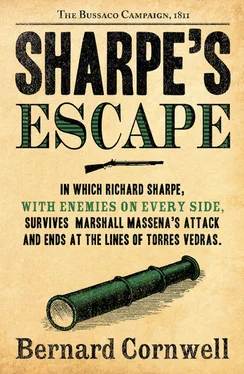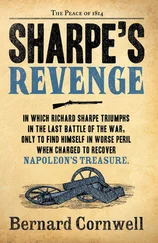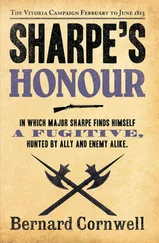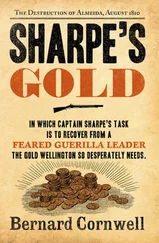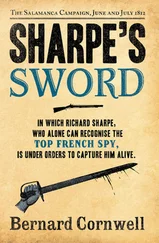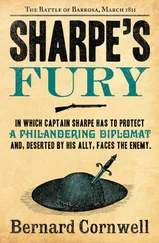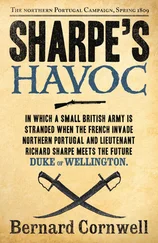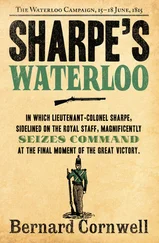SHARPE’S
ESCAPE
Richard Sharpe and the
Bussaco Campaign, 1811
BERNARD CORNWELL

This novel is a work of fiction. The incidents and some of the characters portrayed in it, while based on real historical events and figures, are the work of the author’s imagination.
Published by HarperCollins Publishers Ltd
1 London Bridge Street
London SE1 9GF
www.harpercollins.co.uk
First published in Great Britain by HarperCollins Publishers 2004
Copyright © Bernard Cornwell 2004
Map © Ken Lewis
Bernard Cornwell asserts the moral right to be identified as the author of this work
A catalogue record for this book is available from the British Library
All rights reserved under International and Pan-American Copyright Conventions. By payment of the required fees, you have been granted the non-exclusive, non-transferable right to access and read the text of this ebook on-screen. No part of this text may be reproduced, transmitted, down-loaded, decompiled, reverse engineered, or stored in or introduced into any information storage and retrieval system, in any form or by any means, whether electronic or mechanical, now known or hereinafter invented, without the express written permission of HarperCollins ebooks
HarperCollins Publishers has made every reasonable effort to ensure that any picture content and written content in this ebook has been included or removed in accordance with the contractual and technological constraints in operation at the time of publication
Source ISBN: 9780007120147
Ebook Edition © MARCH 2012 ISBN: 9780007338658
Version: 2017-05-06
Sharpe’s Escape is for Cece
‘What makes these books such a successful formula is the blend of action, well-researched historical setting, colourful characterization and a juicy sub-plot’
The Times
Table of Contents
Title Page SHARPE’S ESCAPE Richard Sharpe and the Bussaco Campaign, 1811 BERNARD CORNWELL
Copyright Copyright This novel is a work of fiction. The incidents and some of the characters portrayed in it, while based on real historical events and figures, are the work of the author’s imagination. Published by HarperCollins Publishers Ltd 1 London Bridge Street London SE1 9GF www.harpercollins.co.uk First published in Great Britain by HarperCollins Publishers 2004 Copyright © Bernard Cornwell 2004 Map © Ken Lewis Bernard Cornwell asserts the moral right to be identified as the author of this work A catalogue record for this book is available from the British Library All rights reserved under International and Pan-American Copyright Conventions. By payment of the required fees, you have been granted the non-exclusive, non-transferable right to access and read the text of this ebook on-screen. No part of this text may be reproduced, transmitted, down-loaded, decompiled, reverse engineered, or stored in or introduced into any information storage and retrieval system, in any form or by any means, whether electronic or mechanical, now known or hereinafter invented, without the express written permission of HarperCollins ebooks HarperCollins Publishers has made every reasonable effort to ensure that any picture content and written content in this ebook has been included or removed in accordance with the contractual and technological constraints in operation at the time of publication Source ISBN: 9780007120147 Ebook Edition © MARCH 2012 ISBN: 9780007338658 Version: 2017-05-06
Dedication Sharpe’s Escape is for Cece
Epigraph ‘What makes these books such a successful formula is the blend of action, well-researched historical setting, colourful characterization and a juicy sub-plot’ The Times
Map
Part One PART ONE
Chapter One
Chapter Two
Chapter Three
Chapter Four
Chapter Five
Part Two: Coimbra
Chapter Six
Chapter Seven
Chapter Eight
Chapter Nine
Chapter Ten
Part Three: The Lines of Torres Vedras
Chapter Eleven
Chapter Twelve
Chapter Thirteen
Historical Note
Sharpe’s Story
Keep Reading
About the Author
The SHARPE Series (in chronological order)
The SHARPE Series (in order of publication)
Also by Bernard Cornwell
About the Publisher
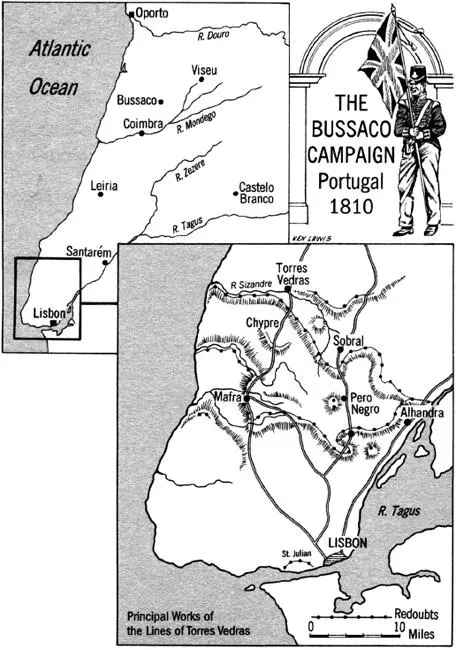
PART ONE

Mister Sharpe was in a bad mood. A filthy mood. He was looking for trouble in Sergeant Harper’s opinion, and Harper was rarely wrong about Captain Sharpe, and Sergeant Harper knew well enough not to engage his Captain in conversation when Sharpe was in such a black temper, but on the other hand Harper liked to live dangerously. ‘I see your uniform’s been mended, sir,’ he said cheerily.
Sharpe ignored the comment. He just marched on, climbing the bare Portuguese slope under the searing sun. It was September 1810, almost autumn, yet the heat of late summer hammered the landscape like a furnace. At the top of the hill, another mile or so ahead of Sharpe, stood a barn-like stone building next to a gaunt telegraph station. The station was a black timber scaffolding supporting a high mast from which signalling arms hung motionless in the afternoon’s heat.
‘It’s a rare nice piece of stitching on that jacket,’ Harper went on, sounding as though he did not have a care in the world, ‘and I can tell you didn’t do it yourself. It looks like a woman’s work, so it does?’ He inflected the last three words as a question.
Sharpe still said nothing. His long, straight-bladed cavalry sword banged against his left thigh as he climbed. He had a rifle slung on his shoulder. An officer was not supposed to carry a longarm like his men, but Sharpe had once been a private and he was used to carrying a proper gun to war.
‘Was it someone you met in Lisbon, now?’ Harper persisted.
Sharpe simmered, but pretended he had not heard. His uniform jacket, decently mended as Harper had noticed, was rifle green. He had been a rifleman. No, he still thought of himself as a rifleman, one of the elite men who carried the Baker rifle and wore the dark green instead of the red, but the tides of war had stranded him and a few of his men in a redcoat regiment and now he commanded the light company of the South Essex who were following him up the hill. Most wore the red jackets of the British infantry and carried smoothbore muskets, but a handful, like Sergeant Harper, still kept their old green jackets and fought with the rifle.
‘So who was she?’ Harper finally asked.
‘Sergeant Harper,’ Sharpe was finally goaded into speaking, ‘if you want bloody trouble then keep bloody talking.’
‘Yes, sir,’ Harper said, grinning. He was an Ulsterman, a Catholic and a sergeant, and as such he was not supposed to be friends with an Englishman, a heathen and an officer, but he was. He liked Sharpe and knew Sharpe liked him, though he was wise enough not to say another word. Instead he whistled the opening bars of the song ‘I Would that the Wars Were all Done’.
Sharpe inevitably thought of the words that accompanied the tune; ‘In the meadow one morning, all pearly with dew, a fair pretty maiden plucked violets so blue’, and Harper’s delicate insolence forced him to laugh aloud. He then swore at the Sergeant, who was grinning with triumph. ‘It was Josefina,’ Sharpe admitted.
Читать дальше
